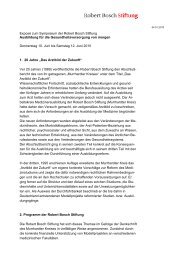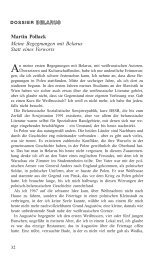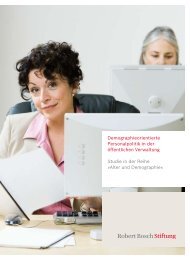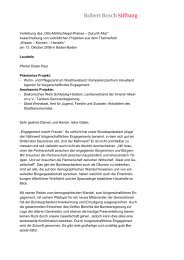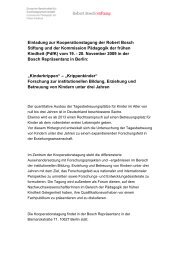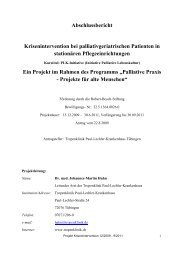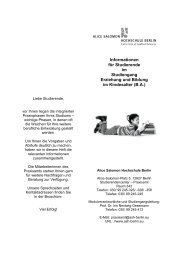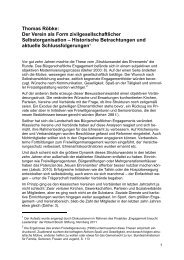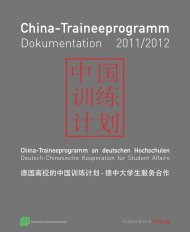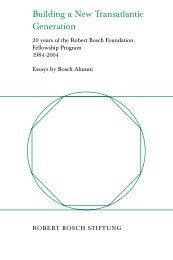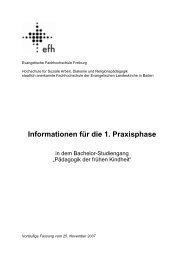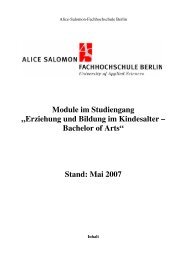EUIF concept note (PDF) - Robert Bosch Stiftung
EUIF concept note (PDF) - Robert Bosch Stiftung
EUIF concept note (PDF) - Robert Bosch Stiftung
Create successful ePaper yourself
Turn your PDF publications into a flip-book with our unique Google optimized e-Paper software.
The EU Integration Forum (<strong>EUIF</strong>)The <strong>EUIF</strong> 2012The EU Integration Forum is a groundbreaking initiative launched by the <strong>Robert</strong><strong>Bosch</strong> <strong>Stiftung</strong> to bring together more than 100 young political decisionmakersfrom all 27 EU Members States and all levels of government once ayear to debate the challenges facing the European Union, and to create anEU-wide network of young leaders and thinkers committed to helping to shapethe Union’s future.Now in its second year, the Forum has already demonstrated its value as aplatform for exchanging views on the key issues facing the EU now and in thefuture, when Europe will be looking to this younger generation of politicians toprovide the leadership and vision so desperately needed to meet the manyserious challenges confronting us.The first gathering of these rising stars in the EU’s political firmament tookplace in 2011, when participants met to discuss whether there was a need fora new ‘pact’ to reconnect the EU with its citizens. This year’s Forum will focuson whether the emergence of a two-speed Europe is inevitable in the wake ofthe euro-zone crisis and, if so, whether this could be the key to the EU’s longtermsurvival or the beginning of the end for the European integration project.The EU Integration Forum moves around the Union every year as part of itsmission to promote genuine transnational dialogue. The 2012 meeting willtake place in Rome, the city where the EU’s founding treaty was signed andthe capital of a country which has always been at the heart of the Europeanproject but now finds itself in the eye of the euro-crisis storm, prompting an intensedebate about its future direction and place in Europe.Sitz: Stuttgart, Amtsgericht Stuttgart, HRB 109, Geschäftsführung: Dieter Berg, Dr. Ingrid Hamm<strong>Robert</strong> <strong>Bosch</strong> <strong>Stiftung</strong> GmbH, Heidehofstraße 31, 70184 Stuttgart; Postfach 10 06 28, 70005 StuttgartTelefon +49 (0) 711/460 84-0, Telefax +49 (0) 711/460 84-1094, www.bosch-stiftung.deBankverbindung: Landesbank Baden-Württemberg, Konto 740 65007 50, BLZ 600 501 01
Theme of the 2012 <strong>EUIF</strong>“Two-speed” Europe: key to the EU’s salvation or beginning of the endfor the European integration project?page 2As the euro crisis has intensified, attention has focused on the divisions andtensions within the EU over how best to respond to the crisis, and on the failureof Europe’s leaders to find a lasting solution to a situation which nowthreatens the global economy. But, as has so often been the case in the EuropeanUnion’s history, the crisis has also acted as a catalyst for a huge leapforward in European integration, with euro-zone members accepting a degreeof EU-imposed budget discipline and economic coordination that would havebeen unthinkable just a few years ago.So is a two-speed Europe now inevitable, with countries inside the euro zoneforging ahead with even closer economic integration while those outside areleft behind? Could it also encourage the development of an ‘inner core’ ofcountries keen to move ahead in a wider range of policy areas, thereby creatingan even smaller ‘club within a club’. And if this happens, would it be goodor bad for the EU in the long term?Some argue that a two-speed Europe contains the seeds of the EU’s destruction,fatally undermining the principle that all Member States are equal, creatinga rift between ins and outs which will only widen over time and eventuallyresult in a permanent two-tier Europe made up of first- and second-classmembers. Others insist that it could be the key to the EU’s salvation, allowingthose who want to move forward to do so without being held back by the restand those who want to remain in the slow lane for now to jump aboard thefaster-moving train when they are ready to do so.Linked to this is the question of whether a two-speed Europe could enhancethe EU’s standing on the international stage by enabling the ’inner core’ to respondmore effectively to global challenges, or risks undermining Europe’s politicalclout by relegating some its key players to the second division andthereby marginalising them.Against this backdrop of the potential deepening division of the EU into twoinstitutional ‘camps’ is the stark reality of a Europe increasing divided alongeconomic lines, as the gap between its richest and poorest Member Statesand regions widens once again in the wake of the crisis. This is most graphicallyillustrated by the differences in youth unemployment rates across theEU, which now range from nearly 50% in Spain and Greece to only around8% in Germany, Austria and the Netherlands, threatening to create a ‘lostgeneration’’ in the worst affected countries.
Break-out sessions: Parallel break-out sessions before and after lunch willexplore the two key questions outlined above in more detail, with parallel sessionson the same themes in smaller groups to give as many participants aspossible the chance to contribute to the debate. Expert facilitators will betasked with moderating the break-out sessions and will be given a set of keyquestions to address (see below) and rapporteurs from the think tank worldwill be tasked with preparing a summary of the discussion to be presented atthe closing plenary session.page 4The morning break-out sessions will focus on the implications of a twospeedEurope divided along institutional lines for the EU as a whole, its MemberStates and its regions. The discussion will focus on answering the followingquestions:Is a two-speed Europe now inevitable? If so, what are the potential advantagesand disadvantages for the EU as a whole, and for those in the fastand slow lanes, both at national and regional level?Are safeguards needed to ensure that this does not lead to the permanentdivision of Europe into a two-tier club, with first- and second-class members?What are the risks of a two-tier club for Member States and for regions?What policy areas could countries in an ‘inner core’ focus on to maximisethe benefits of closer cooperation without discriminating unfairly againstthose in the ‘slow lane’?The afternoon break-out sessions will focus on the implications of a twospeedEurope divided along economic lines, as the gap between the EU’srichest and poorest Member States and regions widens. The discussion willfocus on answering the following questions:What can the EU do to prevent the creation of a two-tier Europe permanentlydivided along economic lines?What will the consequences be if it fails to take effective action to addressthis issue, in line with the commitment to economic, social and territorialcohesion enshrined in its treaties?In particular, what more can and should the EU do to prevent the emergenceof a ‘lost generation’ in those Member States where youth unemploymenthas risen to alarming levels, with potentially huge economic andsocial consequences?Feedback session & closing address: In the feedback session, the rapporteursof the break-out sessions will give 2-3 minute presentations on each discussionon the basis of pre-defined questions outlined above, followed by anopen debate with the floor to discuss the outcomes.



